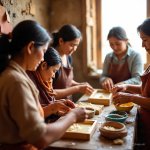I once met a woman named Sushila in a small village near Bundelkhand. She was quiet at first, draped in a faded saree, her hands calloused from years of hard labor. But when she started talking about the soap-making business she built from scratch, her eyes lit up. That spark of pride, of ownership, of self-belief — was unforgettable.
Sushila never studied beyond 8th grade. She didn’t know what “entrepreneurship” meant. But she knew how to survive, how to adapt, and how to dream. And that’s what rural entrepreneurship is made of — not buzzwords, but bravery.
This kind of entrepreneurship doesn’t just fill wallets. It restores dignity.
It says to a young boy in a remote village, “You don’t have to leave your parents and chase a job in the city. You can create something here.”
It tells a mother of three, “Your hands can build more than rotis. They can build a future.”
And that makes them heroes, even if no one claps for them.
This is how rural change happens. Quietly. Locally. Powerfully.
It’s the mother who no longer asks her husband for grocery money.
It’s the teenager who teaches his father how to sell on WhatsApp.
It’s the grandmother who turns pickles into prosperity.
These aren’t just business stories — they are human stories. And they deserve to be told.
Sushila never studied beyond 8th grade. She didn’t know what “entrepreneurship” meant. But she knew how to survive, how to adapt, and how to dream. And that’s what rural entrepreneurship is made of — not buzzwords, but bravery.
The Spirit of Building Something Your Own
In big cities, startups come with pitch decks, investors, and PR buzz. In villages, startups are born in backyards and verandahs. They begin with someone asking, “Can I sell this papad? Can I teach stitching? Can I earn without leaving my home?”This kind of entrepreneurship doesn’t just fill wallets. It restores dignity.
It says to a young boy in a remote village, “You don’t have to leave your parents and chase a job in the city. You can create something here.”
It tells a mother of three, “Your hands can build more than rotis. They can build a future.”
The Road Isn’t Easy
Rural entrepreneurs aren’t lacking ideas. They’re lacking access:- To loans that don’t come with humiliation
- To markets that don’t treat them as invisible
- To train those wh speak their language and respects their pace
And that makes them heroes, even if no one claps for them.
Small Efforts, Big Change
When a woman like Sushila starts earning, other women notice. They ask questions. They come forward. And soon, one business becomes a circle of support — a ripple of courage in a world that has long told them to stay small.This is how rural change happens. Quietly. Locally. Powerfully.
What We Can Do
- Talk about them. Share their stories. Not just unicorn founders in metros, but hidden stars in villages.
- Support local products. Buy handmade, buy rural, buy responsibly.
- Advocate for better systems. More microcredit, fewer barriers. More respect, less red tape.
Beyond Numbers
Rural entrepreneurship is not just about income. It’s about belonging, dignity, and control over one’s life.It’s the mother who no longer asks her husband for grocery money.
It’s the teenager who teaches his father how to sell on WhatsApp.
It’s the grandmother who turns pickles into prosperity.
These aren’t just business stories — they are human stories. And they deserve to be told.



